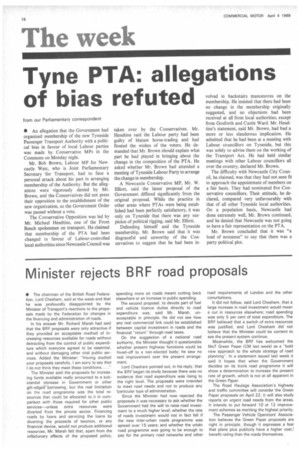Minister rejects BRF road proposals
Page 20

If you've noticed an error in this article please click here to report it so we can fix it.
• The chairman of the British Road Federation, Lord Chesham, said at the week-end that he was profoundly disappointed by the Minister of Transport's reactions to the proposals made by the Federation for changes in the financing and administration of roads.
In his answer Mr. Richard Marsh had said that the BRF proposals were only attractive if they provided an acceptable method of increasing resources available for roads without detracting from the control of public expenditure which everyone agreed to be essential, and without damaging other vital public services. Added the Minister: "Having studied your proposals carefully. I am sorry to say that I do not think they meet these conditions...."
The Minister said the proposals for increasing funds available really amounted to a substantial iritrease in Government or other gilt-edged' borrowing, but the real limitation on the road programme was the total resources that could be allocated to it in comparison with those required for other public
services unless extra resources were diverted from the private sector. Financing roads by loans and servicing the loans by diverting the proceeds of taxation, or any financial device, would not produce additional resources. Mr. Marsh felt that, apart from the inflationary effects of the proposed policy,
spending more on roads meant cutting back elsewhere or an increase in public spending.
The second proposal, to devote part of fuel and vehicle licence duties directly to road expenditure was, said Mr. Marsh, unacceptable in principle. He did not see how any real commercial link could be established between capital investment in roads and the financial "returnthrough road taxes.
On the suggestion of a national road authority, the Minister thought it questionable whether present highway functions could be hived-off to a non-elected body; he saw no real improvement over the present arrangement.
Lord Chesham pointed out, in his reply, that the BR F began its study because there was no evidence that road expenditure was rising to the right level. The proposals were intended to meet road needs and not to produce any 'particular type of administration.
Since the Minister had now rejected the proposals it was necessary to ask whether the Government had the will to raise road investment to a much higher level; whether the rate of roads investment would not in fact fall if the new inter-urban roads programme was spread over 15 years; and whether the urban road programme was going to be enough to pay for the primary road networks and other road requirements of London and the other conurbations.
It did not follow, said Lord Chesham, that a large increase in road investment would mean a cut in resources elsewhere; road spending was only 5 per cent of total expenditure. The BRF believed that a switch of extra resources was justified, and Lord Chesham did not believe that the Minister could be content to see the present system continue.
Meanwhile, the BRF has welcomed the MoT Green Paper (CM last week) as a "bold new approach to the whole strategy of road planning". In a statement issued last week it said it hopes that when the Government decides on its trunk road programme it will show a determination to increase the present rate of growth, which is not at all apparent in the Green Paper.
The Road Haulage Association's highway and traffic committee will consider the Green Paper proposals on April 22. It will also study reports on urgent road needs from the areas. It intends to put forward 10 or 12 improvement schemes as meriting the highest priority.
The Passenger Vehicle Operators' Association believes the Green Paper proposals are right in principle, though it expresses a fear that plans plus publicity have a higher cost/ benefit rating than the roads themselves.










































































































